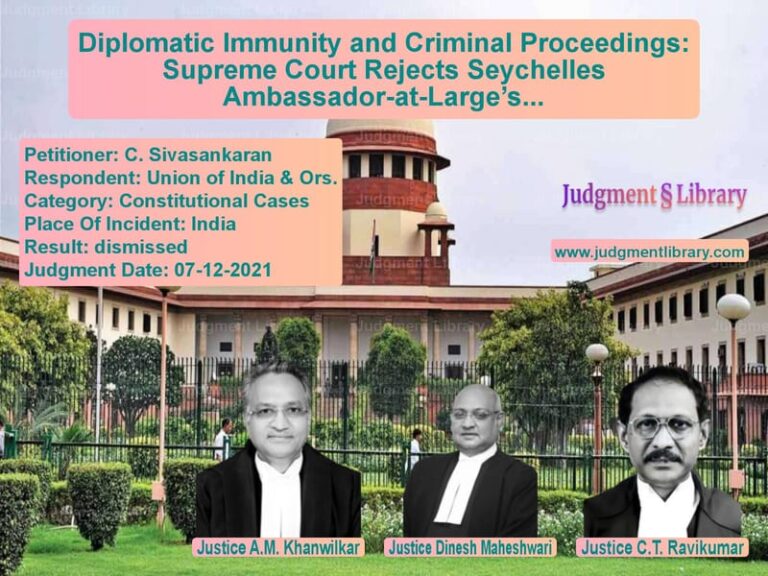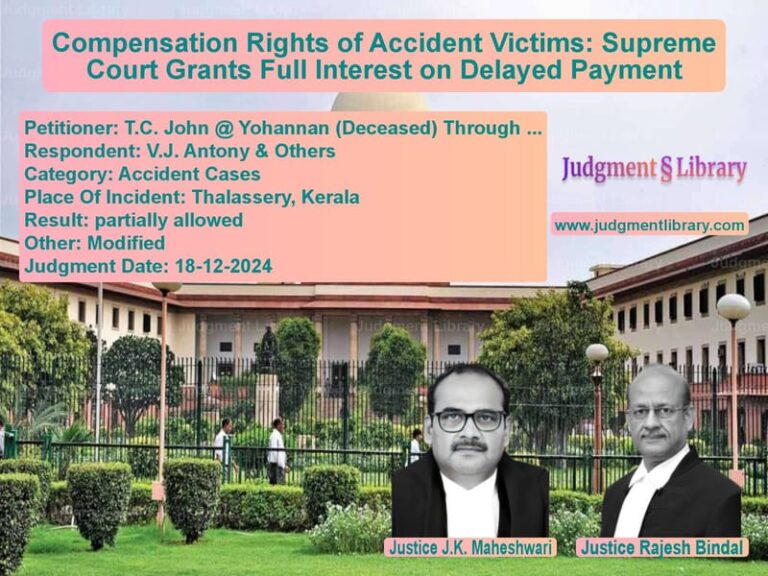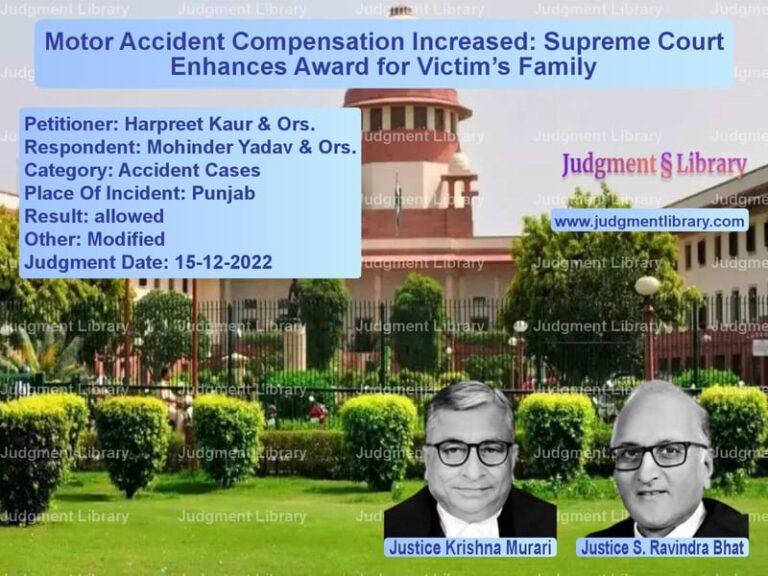Supreme Court Rules on Maintenance Rights in Null and Void Marriages
The Supreme Court of India, in the case of Krishnaveni Rai v. Pankaj Rai & Anr., examined the legal validity of a second marriage contracted during the pendency of an appeal against a decree of divorce. The Court also ruled on whether a wife in such a marriage is entitled to maintenance under Section 125 of the Code of Criminal Procedure (Cr.P.C.).
Background of the Case
The appellant, Krishnaveni Rai, was previously married to Arvind Chenjee in 1989. Their marriage was dissolved by a decree of divorce on June 28, 2005, by the Family Court in Hyderabad. The period for filing an appeal against the decree expired on September 26, 2005, but no appeal was filed within the limitation period.
However, in August 2006—almost a year later—the appellant filed an appeal against the divorce decree. Although the delay was condoned, the appeal was never stayed and was eventually withdrawn in September 2016.
In the meantime, the appellant remarried Pankaj Rai on December 13, 2014. However, this marriage also broke down, leading to multiple legal disputes.
Key Legal Issues
- Was the second marriage of the appellant null and void under the Hindu Marriage Act?
- Was the appellant entitled to maintenance under Section 125 of the Cr.P.C. despite the alleged nullity of her second marriage?
- Did the High Court err in denying maintenance based on the claim that the second marriage was void?
Arguments by the Parties
Arguments by the Appellant (Krishnaveni Rai)
- The second marriage was not void since the appeal against the first divorce was filed beyond the limitation period.
- Even if the marriage were considered void, maintenance could not be denied unless there was a formal declaration of nullity.
- The High Court misinterpreted the law by treating the marriage as void solely because the appeal against the first divorce was pending.
Arguments by the Respondent (Pankaj Rai)
- The appellant’s second marriage was performed while an appeal against her first divorce was pending, rendering it void under the Hindu Marriage Act.
- Since the marriage was void, the appellant had no legal status as a wife and was not entitled to maintenance under Section 125 Cr.P.C.
- The High Court was correct in dismissing the appellant’s maintenance claim.
Supreme Court’s Observations
The Supreme Court, comprising Justices Indira Banerjee and M.R. Shah, made the following key observations:
1. Validity of the Second Marriage
The Court noted that Section 15 of the Hindu Marriage Act allows a divorced person to remarry if:
- No appeal is filed within the limitation period, or
- If an appeal is filed but dismissed.
Since the appellant’s appeal was filed beyond the limitation period and was never stayed, the Court held:
“A marriage contracted after the period of limitation for appeal has expired cannot be treated as void merely because a delayed appeal was later filed.”
2. Right to Maintenance Under Section 125 Cr.P.C.
The Court emphasized that a wife is entitled to maintenance unless a marriage is declared void by a competent court. It ruled:
“A marriage which has not been declared void by a competent court cannot be a ground to deny maintenance under Section 125 Cr.P.C.”
3. Flawed Approach of the High Court
The Supreme Court criticized the High Court’s approach of assuming the second marriage was void and denying maintenance without a formal declaration of nullity. The Court observed:
“The High Court erred in dismissing the appellant’s maintenance claim solely on the assumption that the marriage was void, without any legal proceedings declaring it so.”
Final Judgment
The Supreme Court allowed the appeal and set aside the High Court’s judgment. It ruled that:
- The second marriage of the appellant was not void under the Hindu Marriage Act.
- The appellant was entitled to claim maintenance under Section 125 Cr.P.C.
- The matter was remanded to the appropriate court for determining the amount of maintenance.
- The respondent was directed to pay interim maintenance of Rs. 20,000 per month to the appellant.
Key Takeaways
- A marriage is not automatically void if an appeal against a divorce decree is filed after the limitation period.
- Maintenance under Section 125 Cr.P.C. cannot be denied without a formal declaration of nullity of marriage.
- The High Court’s approach was incorrect in assuming a marriage is void without proper legal proceedings.
- Interim maintenance must be provided while the matter is adjudicated.
Conclusion
The Supreme Court’s ruling in Krishnaveni Rai v. Pankaj Rai & Anr. reinforces that maintenance rights cannot be denied solely based on the assumption of nullity of marriage. This judgment sets a crucial precedent in family law, ensuring that women are not deprived of their rights due to legal technicalities.
Petitioner Name: Krishnaveni Rai.Respondent Name: Pankaj Rai & Anr..Judgment By: Justice Indira Banerjee, Justice M.R. Shah.Place Of Incident: Hyderabad, Telangana.Judgment Date: 19-02-2020.
Don’t miss out on the full details! Download the complete judgment in PDF format below and gain valuable insights instantly!
Download Judgment: Krishnaveni Rai vs Pankaj Rai & Anr. Supreme Court of India Judgment Dated 19-02-2020.pdf
Direct Downlaod Judgment: Direct downlaod this Judgment
See all petitions in Alimony and Maintenance
See all petitions in Child Custody
See all petitions in Domestic Violence
See all petitions in Judgment by Indira Banerjee
See all petitions in Judgment by Mukeshkumar Rasikbhai Shah
See all petitions in allowed
See all petitions in Remanded
See all petitions in supreme court of India judgments February 2020
See all petitions in 2020 judgments
See all posts in Divorce Cases Category
See all allowed petitions in Divorce Cases Category
See all Dismissed petitions in Divorce Cases Category
See all partially allowed petitions in Divorce Cases Category







